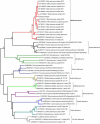Detection of mink astrovirus in Poland and further phylogenetic comparison with other European and Canadian astroviruses
- PMID: 33860418
- PMCID: PMC8164600
- DOI: 10.1007/s11262-021-01834-z
Detection of mink astrovirus in Poland and further phylogenetic comparison with other European and Canadian astroviruses
Abstract
Mink astrovirus infection remains a poorly understood disease entity, and the aetiological agent itself causes disease with a heterogeneous course, including gastrointestinal and neurological symptoms. This paper presents cases of astrovirus infection in mink from continental Europe. RNA was isolated from the brains and intestines of animals showing symptoms typical of shaking mink syndrome (n = 6). RT-PCR was used to amplify astrovirus genetic material, and the reaction products were separated on a 1% agarose gel. The specificity of the reaction was confirmed by sequencing fragment coding RdRP protein (length of sequencing product 170 bp) from all samples. The presence of astrovirus RNA was detected in each of the samples tested. Sequencing and bioinformatic analysis indicated the presence of the same variant of the virus in all samples. Comparison of the variant with the sequences available in bioinformatics databases confirmed that the Polish isolates form a separate clade, closely related to Danish isolates. The dissimilarity of the Polish variant to those isolated in other countries ranged from 2.4% (in relation to Danish isolates) to 7.1% (in relation to Canadian isolates). Phylogenetic relationships between variants appear to be associated with the geographic distances between them. To our knowledge, this work describes the first results on the molecular epidemiology of MAstV in continental Europe. The detection of MAstV in Central Europe indicates the need for further research to broaden our understanding of the molecular epidemiology of MAstV in Europe.
Keywords: Mink astrovirus; Molecular diagnostics; Molecular polymorphism; Phylogenetics; Shaking mink syndrome.
Conflict of interest statement
The authors declare that there is no conflict of interest.
Figures


References
MeSH terms
LinkOut - more resources
Full Text Sources
Other Literature Sources
Research Materials

